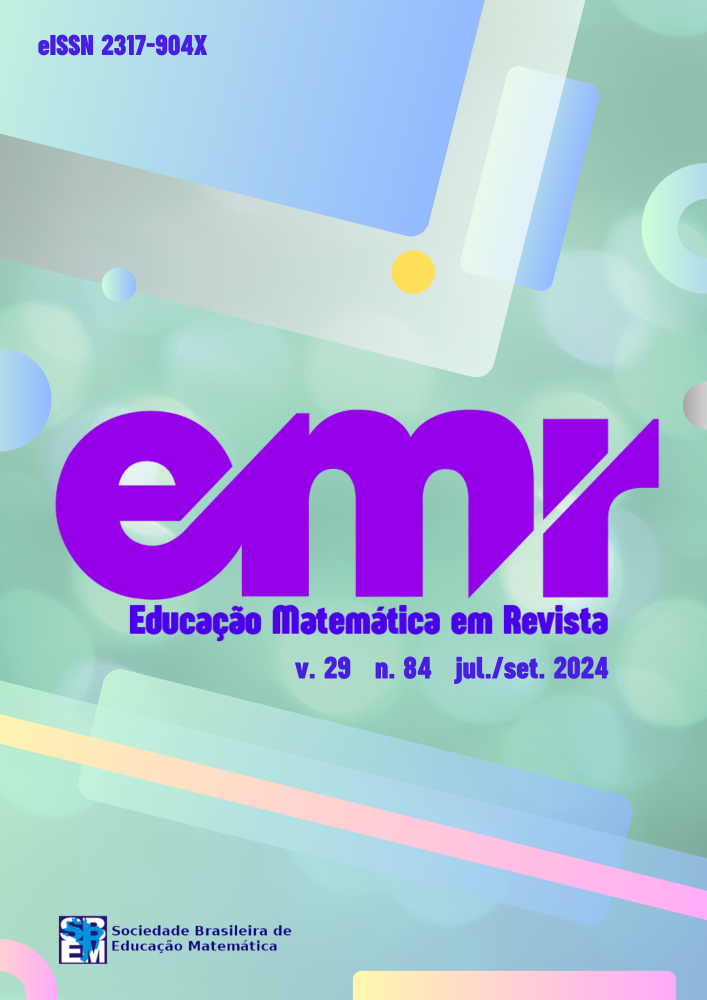Exponential Functions and Recursive Logic with Tower of Hanoi: Computational Thinking and Constructionism
DOI:
https://doi.org/10.37001/emr.v29i84.3566Keywords:
Exponential Function, GeoGebra, Recursive Logic, ConstructionismAbstract
This research examines the knowledge construction process in exponential functions, employing the logical-recursive development of the Tower of Hanoi puzzle pieces and computational graphic transformations in the context of high school Mathematics education. Conducted at the Innovation Laboratory of IF-Goiano, participants crafted Tower of Hanoi representations and developed recursive computational models. Data, derived from computational tools, photography, and interviews, were qualitatively analyzed through the lenses of Computational Thinking and Constructionism. Through Data Triangulation, interdependent analysis categories were established. Results indicate that the construction of Exponential Function knowledge is a dynamic and nonlinear process, involving reflection-argumentation of intuitive-recursive and mathematical logical concepts. Construction occurs through the bidirectional transition of refining conceptual-procedural and algebraic-geometric meanings, emphasizing shared semantic aspects. These findings underscore the relevance of an intellectually active learning context, preventing students from becoming mere information reproducers.
Downloads
References
AZEVEDO, G. T. Processo formativo em Matemática: invenções robóticas para o Parkinson. 2022. Tese (Doutorado em Educação Matemática) – Instituto de Geociências e Ciências Exatas, Universidade Estadual Paulista, Rio Claro, 2022. Disponível em: http://hdl.handle.net/11449/236186. Acesso em: 31 de Jul. 2024.
AZEVEDO, G. T.; ARAÚJO, U. F. Desenvolvimento Científico-Robótico no âmbito da formação em Matemática: pensamento computacional e relevância social. Revista Internacional de Pesquisa em Educação Matemática, v. 14, n. 1, p. 1-17, 15 abr. 2024. Disponível em: https://doi.org/10.37001/ripem.v14i1.3706. Acesso em: 31 de Jul. 2024.
AZEVEDO, G. T.; MALTEMPI, M. V.; LYRA, G. M. V. Produção de games nas aulas de Matemática: por que não? Acta Scientiae, Canoas, v. 20, n. 1, p. 950-966, 2018. Disponível em: https://doi.org/10.17648/acta.scientiae.v20iss5id4152. Acesso em: 31 de Jul. 2024.
AZEVEDO, G. T.; MALTEMPI, M. V. Invenções robóticas para o tratamento de Parkinson: pensamento computacional e formação matemática. Bolema, Rio Claro, v. 35, n. 69, p. 63-88, 2021. Disponível em: https://doi.org/10.1590/1980-4415v35n69a04. Acesso em: 31 de Jul. 2024.
AZEVEDO, G. T.; MALTEMPI, M. V.; LYRA-SILVA, G. V. Processo formativo do aluno em Matemática: jogos digitais e tratamento de Parkinson. Zetetiké, Campinas, v. 26, n. 3, p. 569-585, 2018. Disponível em: http://dx.doi.org/10.20396/zet.v26i3.8651962. Acesso em: 31 de Jul. 2024.
AZEVEDO, G. T.; MALTEMPI, M. V. Processo de aprendizagem de Matemática à luz das metodologias ativas e do pensamento computacional. Ciência & Educação, v. 26, p. 1-18, 2020. Disponível em: https://doi.org/10.1590/1516-731320200061. Acesso em: 31 de Jul. 2024.
AZEVEDO, G. T.; MALTEMPI, M. V. Desenvolvimento de habilidades e invenções robóticas para impactos sociais no contexto de formação em Matemática. Ciência & Educação, v. 29, p. 1-21, 2023. Disponível em: https://doi.org/10.1590/1516-731320230016. Acesso em: 31 de jul. de 2024.
AZEVEDO, G. T.; MALTEMPI, M. V.; POWELL, A. Contexto formativo de invenção robótico-matemática: pensamento computacional e matemática crítica. Bolema [online], v. 36, n. 72, p. 214-238, 2022. Disponível em: https://doi.org/10.1590/1980-4415v36n72a10. Acesso em: 17 out. 2023.
BARBA, L. Computacional Thinking: I do not think it means what you think it means. 2016. Disponível em: https://lorenabarba.com/blog/computational-thinking-i-do-not-think-it-means-what-you-think-it-means/. Acesso em: 02 mai. 2023.
BICUDO, M. A. V. Pesquisa qualitativa e pesquisa qualitativa segundo a abordagem fenomenológica. In: BORBA, M. C.; ARAÚJO, J. L. (org.). Pesquisa qualitativa em educação matemática. São Paulo: Autêntica, 2006. p. 100-118.
BLIKSTEIN P. Travels in Troy with Freire: Technology as an agent for emancipation. In: NOGUERA P.; TORRES C. A. (ed.). Social justice education for teachers: Paulo Freire and the possible dream. Rotterdam: Sense, 2008. p. 205–244.
BOGDAN, R.; BIKLEN, S. Investigação qualitativa em educação: uma introdução à teoria e aos métodos. Porto: Porto Editora, 1994.
BRASIL. Base nacional comum curricular. Brasília: Ministério da Educação, 2018. Disponível em: http://basenacionalcomum.mec.gov.br/abase/#medio/a-area-de-matematica-e-suas-tecnologias. Acesso em: 14 jan. 2023.
D’AMBROSIO, U.; D’AMBROSIO, B. S. The role of ethnomathematics in curricular leadership in mathematics education. Journal of Mathematics Education at Teachers College, New York, v. 4, n. 1, p. 10-16, 2013.
DENZIN, N. K.; LINCOLN, Y. S. Introduction: the discipline and practice of qualitative research. In: DENZIN, N. K.; LINCOLN, Y. S. Handbook of qualitative research. 2. ed. London: Sage, 2000. p. 1-28.
FREITAS, L. C. Os reformadores empresariais da educação: da desmoralização do magistério à destruição do sistema público de educação. Educação & Sociedade, Campinas, v. 33, n. 119, p. 379-404, 2012.
LÉVY, P. Cibercultura. Rio de Janeiro: Editora 34, 1999.
ONU. Assembleia Geral das Nações Unidas. Educação de Qualidade. 2020. Disponível em: https://brasil.un.org. Acesso em: 18 jun. 2023.
PAPERT, S. An exploration in the space of mathematics educations. International Journal of Computers for Mathematical Learning, Dordrecht, v. 1, n. 1, p. 95-123, 1996.
PAPERT, S. A máquina das crianças: repensando a escola na era informática. Porto Alegre: Artes Médicas, 2008.
PAPERT, S. Mindstorms - Children, Computers and Powerful Ideas. New York: Basic Books, Inc., 1980.
PAPERT, S. Situating constructionism. In: HAREL, I.; PAPERT, S. (ed.). Constructionism. Norwood, US: Ablex Publishing, 1991. p. 1-12.
RESNICK, M. Lifelong kindergarten: cultivating creativity through projects, passion, peers and play. Cambridge: MIT Press, 2017.
WING, J. M. Computational thinking: what and why? 2010. Disponível em: http://www.cs.cmu.edu/~CompThink/resources/TheLinkWing.pdf. Acesso em: 20 dez. 2023.
WING, J. M. Research Notebook: Computational Thinking: what and why. Thelink, 2011. Disponível em: https://www.cs.cmu.edu/link/research-notebook-computational-thinking-what-and-why. Acesso em: 28 nov. 2023.
Published
How to Cite
Issue
Section

This work is licensed under a Creative Commons Attribution-NonCommercial-ShareAlike 4.0 International License.






